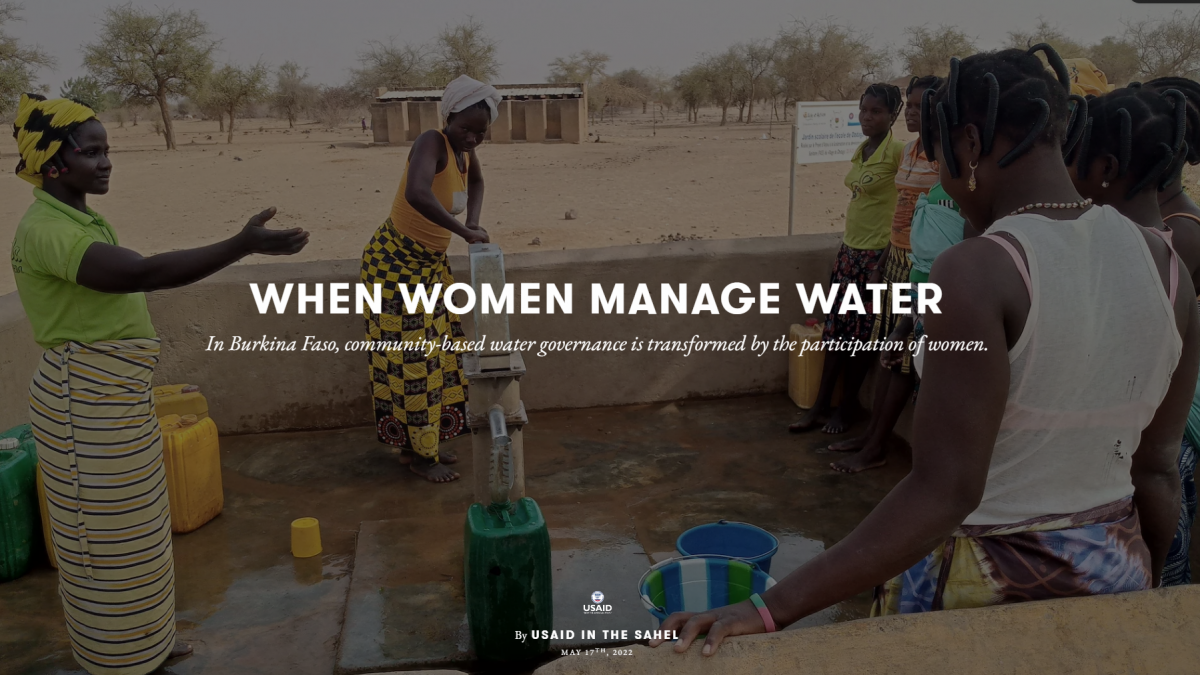
In rural Burkina Faso, most people get their drinking water through boreholes, a narrow vertical shaft drilled into the ground. Women and girls are traditionally responsible for fetching water, often traveling for miles several times a week. When they reach their destination, they sometimes face broken or polluted water sources, which can harm their entire household.
As the primary users, women also serve as the managers and guardians of these waterpoints. They are the first to spot problems such as malfunctioning pumps or when users break hygiene rules. Unfortunately, women are not well represented in Water Users Associations, which are responsible for collecting contributions, ensuring sanitary usage, and repairs and maintenance.

To increase household access to clean and well-maintained boreholes, the USAID TerreEauVie activity set out to increase the proportion of women in the Water Users Associations. They did this by helping 96 associations to improve their management skills and community awareness-raising on the importance of including women. As a result of USAID TerreEauVie's support, among those 96 associations, 10 women were elected presidents, 17 became secretaries, and 58 became treasurers.

“Before being elected president of our Water User Association, I used to go and take water from the borehole, just like all women in the village, for my family's needs," explains Ms. Tene Bourgou. “I was very attentive to the cleanliness around the borehole, and I chastised those who wanted to wash their children or do their laundry there. I guess this intransigence on cleanliness made me well-known. I was still a little surprised to be elected as president because, in our communities, it is not customary to see a woman in this kind of position.”

Since its establishment in April 2021, the association chaired by Ms. Tene has achieved several victories. First, it completed registration with the government authorities. Second, the association paid the yearly 5,000 FCFA fee ($8) for four boreholes to the town hall. Finally, the association organized general assemblies to explain to villagers how their dues would be used, plan for collective cleaning days, and explain how best to avoid contaminating drinking water sources.

“Now users know that if they do not contribute, in case of breakdown, repairs will take a long time,” explains Ms. Tene. “The contribution amounts to 1,000 FCFA ($1.60) per household per year. We also accept millet, peanuts, and corn as a form of payment.”

Ms. Lankoande is a user of one of the four boreholes managed by Ms. Tene’s Water Users Association.
“Of course, we paid the 1000 FCFA contribution for the year. We know what we are paying for and how our money is being used,” she explains. “ I am now confident that we can properly manage our boreholes. The boreholes will be well maintained, and we will always have water. It will also help us gain more weight at the town hall to convince them to increase the number of boreholes. It will reduce the queue at the pump, and we will finally waste less time on the chore of water collection.”

The USAID TerresEauVie Activity is a $39 million initiative implemented by Winrock International over five years (2019-2024) in Niger and Burkina Faso. It is designed to improve access to sustainable, safe drinking water through better water supply and demand management. It also strengthens natural resource and climate risk management policy and governance approaches.
Photography by Lankoande Talara Boukari/USAID TerresEauVie & Salifou Boukari /USAID TerresEauVie
